When a dust collection system starts losing performance, the cause is often inside the collector itself. Filters load up, seals wear, and airflow becomes harder to control. A dust collector filter changeout is the planned replacement of worn filtration components to restore airflow and dust capture. While many facilities replace filters only when problems appear, a complete...
When the air in your plant is clean, everything works better - people, machines, and productivity, and choosing the right dust collector air filters is one of the easiest ways to get there. The filter you select directly impacts worker health, regulatory compliance with OSHA and NFPA standards, and the longevity of your equipment. Whether you manage a manufacturing plant,...
When it comes to industrial air quality, dust collectors are the unsung backbone of production, working quietly in the background to keep air clean, equipment protected, and your facility compliant. At the core of that system are cartridge dust collection filters - compact, high-precision components that trap microscopic particulate before it spreads. When maintained properly,...
Choosing the right approach to dust control starts with understanding how (and where) dust forms in your process. Industrial facility managers often face this critical decision when evaluating dust control solutions for their operations. Understanding when each system excels helps ensure you select the most effective and cost-efficient approach for your facility's unique dust...
Keeping an industrial facility clean and compliant depends on how well your dust collection system performs - air stays cleaner, equipment lasts longer, and utility bills stay in check. If your goal is maximizing dust collection system efficiency, the wins show up across your operation: better air quality, fewer unscheduled stoppages, and predictable maintenance cycles. Now,...
Manufacturing environments rely on dust collection systems to keep air clean and processes stable - but when conditions misalign, a dust collector explosion can turn routine operations into a serious incident. Fine dust particles suspended in air, an ignition source, and equipment confinement can create rapid pressure rise that damages collectors, injures personnel, and halts...
Baghouse dust collectors are the workhorses of industrial air‑filtration. Inside each unit, rows of filter bags trap particles from your manufacturing processes, keeping plant air clean and safe. To know how well the collector is doing its job, you need to watch one key metric: differential pressure. Think of differential pressure as your system's health report. It shows when...
Plasma cutting is a highly effective metal fabrication process that uses an electrically conductive gas to transfer energy from a power supply to any conductive material. While this technology offers precision and speed, it also generates significant amounts of fine particulates, metallic fumes, and hazardous dust that pose serious challenges for high-volume operations....
Dust collector inspections are essential for ensuring efficient performance, reducing fire hazards, and prolonging equipment lifespans. At A.C.T. Dust Collectors, we are here to help you put your business in the best position possible to be successful. With our comprehensive dust collector inspection checklist, you can quickly identify problems and keep your operations running...
At A.C.T. Dust Collectors, we’re dedicated to helping businesses maintain safe and compliant working environments. This is why the release of NFPA 660 is a major development for industries that generate or handle fine particulates.
Food processing dust presents numerous challenges in food manufacturing, including health, safety, food processing regulations, and combustible dust risks. Common food processing dust may come from a wide range of ingredients, such as spices, flour, corn starch, sugar, eggshell dust, flavoring additives, feed, and raw grain agricultural products, and more. Applications can...
Industrial operations require safety, efficiency and regulatory compliance to achieve the highest level of success. Choosing between a bag filter and a cartridge filter is an important decision when it comes to industrial filtration and the dust collection systems your business or factory relies on.
When you start searching for dust collector manufacturers, it’s normal to feel overwhelmed. The specs look similar, the claims sound impressive, and everyone says they can meet your needs. But what you really need is a system that helps protect worker health, supports OSHA/NFPA expectations for dust hazards, and stays efficient without constant filter swaps or shutdowns. In...
As the cooler months approach, it’s important to ensure your factory stays warm — not only to maintain high air quality, but also for the comfort and safety of your employees.
At some point, most industrial shops ask themselves if a dust collector works, and if they really need a dust collector.
If you're dealing with weak suction, dust escaping into the plant, or a differential pressure reading that keeps climbing, your dust collector filters are often the first place to look. The wrong replacement dust collector filters can quietly drain performance, drive up maintenance, and make it harder to stay within air quality and safety limits. The right OEM dust collector...
A successful work environment is not only achieved through high-quality performance but even more importantly — through high-quality working conditions. For those industries that produce dust and other dirty and unwanted particulates, from metalworking to sandblasting and more, the output that results from the manufacturing process can be harmful to employees if not properly...
Industrial dust collection systems play a crucial role in protecting both employees and equipment by removing harmful particulates from the air. A key component of these systems is the cartridge filter, which traps dust and debris so that clean air is recirculated back into your facility. Here at A.C.T. Dust Collectors, we’ve spent years perfecting solutions for a wide range...
The purpose of an industrial dust collector is to create a more efficient operating process and a safer space to work. And while this is true for any organization who installs one, there’s always the possibility of a malfunction or inefficiency taking place. When that happens, you need a dust collector troubleshooting guide. At A.C.T. Dust Collectors, it’s our goal to respond...
Dust collection is important no matter the industry – but one specific type of dust that requires extra attention is abrasive blasting. Properly collecting dust from abrasive blasting and sandblasting ensures health and safety for personnel and efficient operations.
At A.C.T. Dust Collectors, we know that many people looking into industrial dust collectors aren’t sure where to start. Choosing the wrong size can lead to poor air quality, wasted energy, and higher maintenance costs, which are problems that no facility wants. We’re going to cover some of the most important factors in dust collector sizing, from airflow requirements to...
Choosing an industrial baghouse dust collector or a cartridge collector isn’t just about the sticker price. The wrong decision can hurt indoor air quality (IAQ), trigger OSHA or EPA violations, waste energy, and put employees in harm’s way. Because every plant, process, and dust stream is different, there’s no universal solution, but two technologies handle the vast majority...
Being a dealer of industrial dust collection systems comes with its fair share of challenges. You’re expected to quote quickly, answer complex technical questions, and keep customers satisfied - all while relying on manufacturers to deliver on time and stand behind their products. The problem? Not every dust collection system manufacturer makes that easy. Some are slow to...
What do Dust Collectors, Control Panels, Industrial Fans and Filter Cartridges have in common? They all contribute to creating an efficient dust collector that can solve your dust collection needs.
Adding a dust collector to your facility may be one of the best investments you can make. Industrial dust collectors improve shop safety and cleanliness, help you meet compliance regulations, boost employee retention and happiness, reduce equipment maintenance costs, and deliver ongoing value year after year. But here's something many facility managers overlook: dust...
When temperatures drop and facility doors close to conserve heat, your dust collection challenges multiply overnight. Natural ventilation that once helped clear airborne particles disappears. Industrial dust lingers longer in stagnant indoor air. Meanwhile, your outdoor dust collector faces ice formation, motor overloads, and condensation problems that can shut down operations...
A quality dust collector isn't just another line item - it's a system that shapes air quality, safety, and productivity across your floor. The "quality" part matters: better design and media capture more particulate, protect people and equipment, and help you meet standards without costly retrofits. If you look beyond upfront price and consider long-term value, a quality dust...
If you’re a plant manager or business owner, there are many reasons to purchase an industrial dust collector. They improve the health and safety of employees, increase productivity, lead to better product quality, help you meet compliance regulations and help to ensure happier employees.
Plant expanding? Replacing an old dust collector? Getting into compliance? Cleaning up your work environment? If you answered "yes" to any of those questions, improving your industrial indoor air quality should be a top priority. In manufacturing facilities, airborne dust doesn't just settle on equipment - it affects worker health, product quality, equipment performance, and...
A dust collection system can be a big money-saver when you consider the advantages of how it affects your bottom line. Operations that produce dust as a byproduct of their processes rely on an industrial dust collection system to:
In industrial settings, maintaining air quality is crucial for the safety, efficiency, and regulatory compliance of your operations. HEPA after-filters, known for their high efficiency in capturing small particulate matter, play a significant role in ensuring clean air in various industrial applications. Adding a HEPA after-filter to your dust collection system can help clean...
When there is dust in a facility, most people do not consider how it can be costing them money. It may seem like a minor detail that can be attended to when time permits, but the fact of the matter is a dust collector can positively impact your bottom line while helping to keep your facility dust-free.
Baghouse dust collectors and cartridge dust collectors are two common types of industrial air cleaning systems that provide numerous benefits to the well-being of a facility and those working in it. A few benefits of baghouse and cartridge dust collectors include:
When you start looking at dust collection, it’s easy to focus on the big, visible parts: the housing, the fan, the ductwork. But in day-to-day operation, the industrial dust filter inside the collector does a lot of the quiet, critical work. It’s the filter media that separates dust from air so cleaner air can be returned to the building or safely exhausted outside. Choosing a...
Choosing the right industrial dust collection system for your manufacturing environment is an important long-term decision.
Two of the most common types of industrial air cleaning systems are baghouse and cartridge dust collectors.
When solving a dust problem, industrial dust collector parts are somewhat of an afterthought. Truth is, they’re an important factor in determining the true cost of running a dust collector.
Thousands of industrial environments create airborne particles, ranging from sub-micron size smoke to large chunks of plastic, paper or wood. While some dust is hazardous and presents a safety issue, other dust reduces visibility and needs to be removed. Operations creating fumes and smoke use industrial dust collection systems to clear the air.
The grinding of metals and non-ferrous metals produces a fine dust that needs to be removed from the air. When metal particles from grinding and other metalworking applications become airborne, metal dust becomes a hazard.
Metalworking dust is an everyday reality in fabrication shops. Grinding throws particulates into the air, laser cutting creates ultra-fine residue, and welding can add additional fumes and fine particles to the mix. Without the right controls, that material doesn’t stay at the workstation - it drifts, settles, and builds up across the facility. Metal dust is the fine...
Sand, steel shot or grit, glass bead or crushed glass, aluminum oxide and coal slag. These are just a few of the most common blasting abrasives used. Abrasive grit blasting, also known as sandblasting, is the process of propelling a grit of sand-sized particles with compressed air against a surface to remove excess or unwanted materials. The grit blasting process typically...
Many industries utilize laser cutting in their processes. While cutting metal is the most common, laser cutting technology is now applied to a wide range of materials. Laser and plasma-cutting processes generate dust, fumes and various oxides that are dangerous to breathe. Therefore, having a quality laser and plasma cutting dust collector to remove dust and fumes is paramount...
Why is my dust collector not performing properly? It could be as simple as the system is undersized, you have added process equipment as your business grows and the existing system will not handle it. This is just one example, there are many reasons why your system may not be performing as designed.
A reverse pulse (often called a pulse jet or reverse jet) filter cleaning system is a simple action that has significant results. A simple explanation of a reverse pulse filter cleaning system is as follows: in normal dust collector operation, air flows from the outside of the filter media to the center of the filter. The dust is filtered out and left on the outside surface of...
There are many options to consider when choosing a fan for your new dust collection system. The most commonly used fans in dust collectors are the Radial blade fan, the BI (backward inclined) fan, the BC (backward curved) fan and the airfoil fan. Each fan wheel has its own characteristics and performance limitations.
When your production line's sitting still and the budget clock's ticking, hearing "it'll arrive in a few months" is the last thing you need. Every day without a working dust collector means lost output, possible fines, and stress you didn't plan for. Ordering overseas only piles on the delays - build time, port congestion, ocean freight, customs - turning weeks into months you...
In certain industries — chemical processing, pharmaceutical, food and agriculture, metal and woodworking — the air you and your employees breathe in on a daily basis can be compromised. Dirt, dust, debris, gases and chemicals can be floating around in the air, causing issues for your employees, as well as your equipment. A dust collector helps combat this.
Static pressure is often thought to be a scientific phrase that is irrelevant to operations such as dust collection. In reality, it can be one of the main determining factors in how well a dust collection system performs.
If you have the right industrial dust collector for your application, keeping it maintained typically requires a small amount of time and money. However, a dust collector does require the regular maintenance and upkeep.
Industrial facilities that generate combustible materials face serious safety risks when those particles become airborne. A dust collector fire can damage equipment, halt production, and most importantly, put workers in harm’s way. Understanding ignition sources, applying NFPA 484 guidance, and selecting the right fire protection components helps prevent these incidents long...
Having a dust-free facility is important, and dust collectors help to ensure just that. A dust collector removes pollutants from the air, providing your facility with cleaner air, which can provide numerous benefits.
Are you one of those companies with numerous portable dust collectors sprinkled throughout your operation? We can help you determine what type of dust collection your facility needs as it is an important calculation to get right. There are reasons that a central dust collection system can give you a better result.
You buy a powerful dust collector, install it according to spec, and expect the air to clear. But at a few workstations, dust still escapes the hood, and your team keeps dealing with buildup in the duct runs. It’s frustrating, especially when the equipment itself seems “right on paper.” In many facilities, the dust collector isn’t the real issue. The problem is the dust...
Sometimes the need for an industrial dust collection system in a facility is more obvious than others. Dirt, dust, debris, gases and chemicals can be floating around in the air, causing issues for your employees as well as your equipment. An industrial dust collection system helps combat this.
They both collect dust, so how do you determine which one is the better way to go?
Air quality control goes beyond just having a clean workspace. Industrial dust collectors not only clear the air, but they also: Improve health and safety Increase productivity Lead to better product quality Help you meet compliance regulations Help to ensure happier employees
Finding the right dust collection system for your air quality need can be difficult. While finding the correct size is important, the ongoing maintenance cost must also be considered closely. It can be hard to calculate the real cost of a dust collector.
There are several factors to consider when sizing your industrial dust collector, including facility space, application and particulate volume. Of course, the end-goal is to have an efficient industrial dust collector that keeps employees safe and your business running smoothly — but what other factors should you consider?
Industrial dust collectors are essential for maintaining a safe and healthy work environment in many industries. They capture and remove harmful dust particles from the air, preventing them from being inhaled by workers or settling on surfaces. However, for dust collectors to function effectively, their filters need to be properly maintained.
When a dust collector stops performing, most people blame the fan, the controls, or the ductwork. In many plants, the real problem is simpler: the wrong industrial dust filter. A filter that doesn’t fit the application can quietly drag down airflow, drive up energy use, and make a healthy system look like it is failing. An industrial dust filter is not the same as an HVAC...
MERV Rating GraphFilters play a critical role in how well your dust collection system performs, and selecting the right one starts with understanding your application. Different environments produce different types of dust, and using the wrong filter can reduce efficiency, increase wear on your system, and even create safety risks. Matching the filter to your dust type and...
Production welding doesn't stop. High-volume facilities run robotic cells and automated systems for hours - sometimes entire shifts - generating continuous clouds of metal fume and smoke that can overwhelm a workspace in minutes. The problem isn't just volume. Robotic welding processes release metal oxide particles, toxic gases, and ultrafine dust that contaminate air fast....


























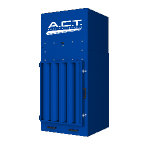
%20Collectors%20Image.png?width=143&height=143&name=ADC%20(Ambient)%20Collectors%20Image.png)
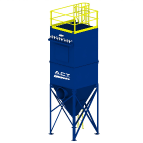

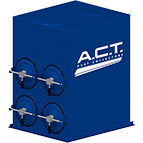
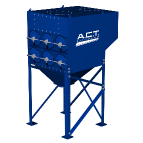
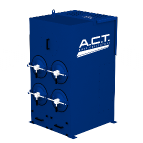


















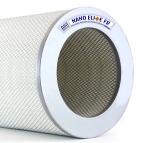


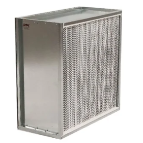
.jpg?width=642&name=ACTion%20Booth%20Filters%20B%20(1).jpg)









































.png?width=642&name=img-f%20(1).png)








-1.jpg?width=642&name=img-f%20(2)-1.jpg)







.jpg?width=642&name=img-f%20(1).jpg)


.png?width=240&height=91&name=ACT%20Dust%20Collectors%20Logo%20Solid%20White%202020%20(1).png)
.png?width=148&height=149&name=usa-manufactured-dust-collectors%20(1).png)